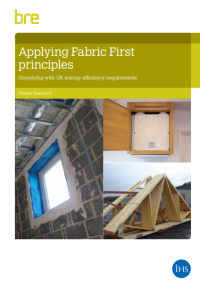Applying Fabric First principles: Complying with UK energy efficiency requirements FB 80
BRE (Building Research Establishment) is an independent, research-based consultancy, testing and training organisation, operating in the built environment and associated industries.
On 31 March 2016, BRE published; Applying Fabric First principles: Complying with UK energy efficiency requirements (FB 80), written by Steven Stenlund.
The 40-page guide provides an understanding of the principles of a 'Fabric First' approach to help developers and house builders design and build homes to meet energy efficiency requirements - including possible future zero carbon or near zero energy homes). It explains how improved thermal performance, examined with reference to SAP 2009 (Standard Assessment Procedure) calculations for a sample housing development, can lead to optimising the fabric design of dwellings.
This includes:
- Position and orientation of dwelling types.
- Fabric improvements.
- Airtightness.
- Thermal bridging.
- Services improvements.
- Developing a standard main specification for application across the site.
The contents of the guide are:
- Executive summary
- Introduction.
- Technical appraisal.
- Determining a site-wide compliance specification.
- Further considerations.
- Appendix: Site scenarios.
[edit] Related articles on Designing Buildings
- Allowable solutions.
- BRE articles on Designing Buildings Wiki.
- BRE Buzz articles on Designing Buildings Wiki.
- BRE Buzz.
- Building Research Establishment.
- Code for sustainable homes.
- Fabric first.
- Fabric first investigation into net zero for existing buildings.
- Fabric first will safeguard heat decarbonisation.
- Passive building design.
- Passivhaus.
- Retrofit.
- Standard Assessment Procedure SAP.
- Zero carbon homes.
- Zero carbon non-domestic buildings.
Featured articles and news
A case study and a warning to would-be developers
Creating four dwellings for people to come home to... after half a century of doing this job, why, oh why, is it so difficult?
Reform of the fire engineering profession
Fire Engineers Advisory Panel: Authoritative Statement, reactions and next steps.
Restoration and renewal of the Palace of Westminster
A complex project of cultural significance from full decant to EMI, opportunities and a potential a way forward.
Apprenticeships and the responsibility we share
Perspectives from the CIOB President as National Apprentice Week comes to a close.
The first line of defence against rain, wind and snow.
Building Safety recap January, 2026
What we missed at the end of last year, and at the start of this...
National Apprenticeship Week 2026, 9-15 Feb
Shining a light on the positive impacts for businesses, their apprentices and the wider economy alike.
Applications and benefits of acoustic flooring
From commercial to retail.
From solid to sprung and ribbed to raised.
Strengthening industry collaboration in Hong Kong
Hong Kong Institute of Construction and The Chartered Institute of Building sign Memorandum of Understanding.
A detailed description from the experts at Cornish Lime.
IHBC planning for growth with corporate plan development
Grow with the Institute by volunteering and CP25 consultation.
Connecting ambition and action for designers and specifiers.
Electrical skills gap deepens as apprenticeship starts fall despite surging demand says ECA.
Built environment bodies deepen joint action on EDI
B.E.Inclusive initiative agree next phase of joint equity, diversity and inclusion (EDI) action plan.
Recognising culture as key to sustainable economic growth
Creative UK Provocation paper: Culture as Growth Infrastructure.
Futurebuild and UK Construction Week London Unite
Creating the UK’s Built Environment Super Event and over 25 other key partnerships.
Welsh and Scottish 2026 elections
Manifestos for the built environment for upcoming same May day elections.
Advancing BIM education with a competency framework
“We don’t need people who can just draw in 3D. We need people who can think in data.”


























